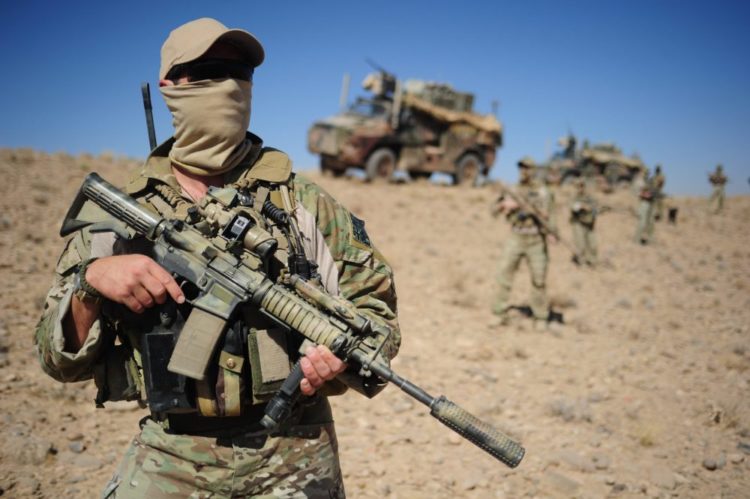Australia’s Special Forces are facing more disturbing war crimes allegations surrounding their involvement in the Afghanistan war.
A U.S. Marine helicopter crew chief has detailed an incident wherein members of the Second Commando Regiment — an Australian Special Forces unit — appeared to have killed an Afghan prisoner. The Marine says Australian special forces shot and killed a bound Afghan prisoner after being told he would not fit on the U.S. aircraft coming to pick them up:
“And the pilot said, ‘That’s too many people, we can’t carry that many passengers.’ And you just heard this silence, and then we heard a pop. And then they said, ‘OK, we have six prisoners.”
“So it was pretty apparent to everybody involved in that mission that they had just killed a prisoner that we had just watched them catch and hogtie,” he added.
The U.S. Marine says that neither he nor any of his crew spoke about what had just happened.
“We were all being recorded on our comms. All of us were pretty aware of what we just witnessed and kind of didn’t want to be involved in whatever came next.”
He says that he later discussed the incident with his crewmates after returning to Camp Bastion, the former British military airbase in Lashkar Gah in Helmand Province, Afghanistan.
“This was the first time we saw something we couldn’t morally justify because we knew somebody was already cuffed up, ready to go, taken prisoner, and we just witnessed them kill a prisoner. This isn’t like a heat of the moment call where you’re trying to make a decision. It was a very deliberate decision to break the rules of war.”
This latest claim comes as a military inquiry finalizes its report into war crimes purportedly committed by SAS members, Australia’s top-tier special forces unit.
Some of the war crimes allegations have been so serious that they proved a catalyst to a four-year Inspector-General inquiry into war crimes. The investigation is headed by New South Wales Supreme Court Justice Paul Brereton, a major general in the Army Reserve. Brereton has already spent four years investigating claims that members of the Special Operations Task Group breached the armed conflict laws between 2005 and 2016.
Some weeks ago, Defence Minister Linda Reynolds said that the investigation neared its conclusion and warned that Australians would be dismayed by its findings.
Already have an account? Sign In
Two ways to continue to read this article.
Subscribe
$1.99
every 4 weeks
- Unlimited access to all articles
- Support independent journalism
- Ad-free reading experience
Subscribe Now
Recurring Monthly. Cancel Anytime.
Tellingly, one interviewee reveals in the document, “Guys just had this blood lust. Psychos. Absolute psychos. And we bred them.” The report reveals that unarmed Afghan civilians and prisoners were shot or had their throats slit by some Australian soldiers with a “large number of illegal killings often gloated about.”
Australian Army commander Lieutenant General Rick Burr said that he has not yet seen Justice Brereton’s report, as the inquiry is independent and ongoing. But he added that as a special forces officer, he finds the allegations deeply troubling. “These are extremely serious allegations and not reflective of who we are and who we must be as professional institutions. We are all determined to establish the facts so that we can act on them.”
In February, the inspector general’s annual report revealed 55 separate incidents or issues under inquiry, “predominantly unlawful killings of persons who were non-combatants or were no longer combatants, but also the cruel treatment of such persons.”
The Australian Army had focused intensely on rebuilding the cultural and ethical base of its special forces even before the shocking allegations first emerged.
Specifically, Australian Defense Force (ADF) commanders have been working to rectify what they’ve described as “catastrophic cultural and professional shortfalls” within the Australian Special Operations Command (SOCOM) and the “corrosive” friction between the significant special forces units, the Special Air Service Regiment, and the commandos.










COMMENTS